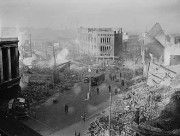|
Home
|
Mar 29, 2021
This week’s themePlaces that have given us multiple toponyms This week’s words coventrate Roman holiday canter Trojan Kentish fire 
Coventry city center after the raid
Previous week’s theme Words borrowed from Yiddish A.Word.A.Day
with Anu GargA couple of weeks ago we went to five places in search of words coined after them. If you travel all this distance, it makes sense to bring back more than just one word. This week we’ll share with you another toponym (a word derived from a place name) that we fetched from those places. If you live in any of these places, drop us a line. How commonly are these terms used there? Coventrate
PRONUNCIATION:
MEANING:
verb tr.: To devastate, such as by heavy bombing.
ETYMOLOGY:
After Coventry, a city in central England, that was devastated in German
bombing during WWII, Nov 14-15, 1940. The Germans coined the verb
coventrieren (to coventrate) after the city to describe any heavy bombing,
and the term was adopted in English as well. Earliest documented use: 1940.
See also, blitzkrieg.
USAGE:
“Fighter and bomber commands were at the heart of the defensive and
offensive strategy; Germany’s cities would be Coventrated.” Paul Oestreicher; The Legacy of Dresden; The Guardian (London, UK); Mar 3, 2004. A THOUGHT FOR TODAY:
At least one way of measuring the freedom of any society is the amount of
comedy that is permitted, and clearly a healthy society permits more
satirical comment than a repressive, so that if comedy is to function in
some way as a safety release then it must obviously deal with these taboo
areas. This is part of the responsibility we accord our licensed jesters,
that nothing be excused the searching light of comedy. If anything can
survive the probe of humour it is clearly of value, and conversely all
groups who claim immunity from laughter are claiming special privileges
which should not be granted. -Eric Idle, comedian, actor, and author (b. 29
Mar 1943)
|
|
Subscriber Services
Awards | Stats | Links | Privacy Policy
Contribute | Advertise
Awards | Stats | Links | Privacy Policy
Contribute | Advertise
© 1994-2026 Wordsmith